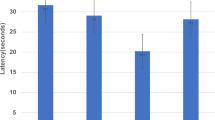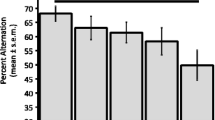Abstract
The ability of four central cholinomimetics to reverse a scopolamine-induced spatial memory impairment or to improve visual recognition memory in primates was examined. Physostigmine (0.04–0.08 mg/kg IM) fully reversed the effects of scopolamine (0.03 mg/kg). Coadministration of pilocarpine (3.0–5.0 mg/kg) caused partial reversal of the scopolamine impairment after intermediate or long retention intervals (10 or 20 s). Treatment with arecoline (0.1–1.8 mg/kg) or nicotine (1.0–2.0 mg/kg) generally did not reverse the effects of scopolamine. A task in which memory could be taxed by increasing the number of visual stimuli presented appeared more sensitive to the effects of cholinomimetics on cognition than the scopolamine reversal model. In this paradigm treatment with physostigmine (0.001, 0.01 or 0.03 mg/kg) increased choice accuracy from about 55 to 70% correct. Arecoline improved performance at one dose only (0.1 mg/kg) which also induced marked adverse side-effects (salivation and tremor). Pilocarpine improved performance in the dose range 0.125–0.35 mg/kg, but not at higher doses which also induced marked salivation. Treatment with nicotine (0.001–2.0 mg/kg tended to improve performance but this did not reach statistical significance. The relevance of these findings for studies in man and for animal models of dementia is discussed.
Similar content being viewed by others
References
Aigner TG, Mishkin M (1986) The effects of physostigmine and scopolamine on recognition memory in monkeys. Behav Neural Biol 45:81–87
Andersson K, Post B (1974) Effects of cigarette smoking on verbal rote learning and physiological arousal. Scand J Psychol 15:263–267
Bartus RT (1978) Evidence for a direct cholinergic involvement in the scopolamine-induced amnesia in monkeys: effects of concurrent administration of physostigmine and methylphenidate with scopolamine. Pharmacol Biochem Behav 9:833–836
Bartus RT (1979) Physostigmine and recent memory: effects in young and aged nonhuman primates. Science 206:1087–1089
Bartus RT, Johnson HR (1976) Short-term memory in the rhesus monkey: disruption from the anticholinergic scopolamine. Pharmacol Biochem Behav 5:39–46
Bartus RT, Dean RL, Beer B (1980) Memory deficits in aged Cebus monkeys and facilitation with central cholinomimetics. Neurobiol Aging 1:145–152
Caine ED (1980) Cholinomimetic treatment fails to impove memory disorder. New Engl J Med 303:585–586
Christie JE, Shering A, Ferguson J, Glen AIM (1981) Physostigmine and arecoline: effects of intravenous infusions in Alzheimer presenile dementia. Br J Psychiatry 138:46–50
Corkin S (1982) Some relationships between global amnesia and the memory impairments in Alzheimer's disease. In: Corkin S, Davies K, Growdon JH, Usdin E, Wurtman RJ (eds) Alzheimers disease: A report of progress in research, vol 19. Raven Press, New York, pp 149–164
Davies P, Verth AH (1978) Regional distribution of muscarinic acetylcholine receptors in normal and Alzheimer's type dementia brains. Brain Res 138:385–392
Davis KL, Mohs RC, Tinklenberg JR, Pfefferbaum A, Hollister LE, Kopell BS (1978) Physostigmine: improvement of longterm memory processes in normal humans. Science 201:272–274
Davis KL, Mohs RC, Davis BM, Levy M, Rosenberg GS, Horvath TB, De Nigris Y, Ross A, Decker P, Rothpearl A (1981) Cholinomimetic agents and human memory: clinical studies in Alzheimer's disease and scopolamine dementia. In: Crook T, Gershon S (eds) Strategies for the development of an effective treatment for senile dementia. Mark Powley, Connecticut, pp 53–69
Elrod K, Buccafusco JJ, Jackson WJ (1988) Nicotine enhances delayed matching-to-sample performance by primates. Life Sci 43:277–287
Evans HL (1975) Scopolamine effects on visual discrimination: modifications related to stimulus control. J Pharmacol Exp Ther 195:105–113
Flicker C, Bartus RT, Crook TH, Ferris SH (1984) Effects of aging and dementia upon recent visuospatial memory. Neurobiol Aging 5:275–283
Freedman M, Oscar-Berman M (1986) Selective delayed response deficits in Parkinson's and Alzheimer's disease. Arch Neurol 43:886–890
Freedman SB, Harley EA, Iversen LL (1988) Biochemical measurement of muscarinic receptor efficacy and its role in receptor regulation. TIPS 9:54–60
Freedman SB, Harley EA, Patel S (1989) Direct measurement of muscarinic agents in the central nervous system of mice using “ex vivo” binding. Manuscript submitted Eur J Pharmacol
Heise GA, Milar KS (1984) Drugs and stimulus control. In: Iversen L, Iversen SD, Snyder SH (eds) Handbook of psychopharmacology, vol 18. Plenum Press, New York, pp 129–190
Irle E, Kessler J, Markowitsch HJ, Hofman W (1988) Primate learning tasks reveal strong impairment in patients with presenile or senile dementia of the Alzheimer type. Brain Cogn 6:429–449
Ksir C (1975) Scopolamine and amphetamine effects on discrimination: interaction wth stimulus control. Psychopharmacology 43:37–41
Morris RG, Kopelman MD (1986) The memory deficits in Alzheimer-type dementia: a review. Q J Exp Psychol 38A:575–602
Moss MB, Albert MS, Butters N, Payne M (1986) Differential patterns of memory loss among patients with Alzheimer's disease, Huntington's disease and alcoholic Korsakoff's syndrome. Arch Neurol 43:239–246
Newhouse PA, Sunderland T, Tariot PN, Blumhardt CL, Weingartner H, Mellow A, Murphy DL (1988) Intravenous nicotine in Alzheimer's disease: a pilot study. Psychopharmacology 95:171–175
Perry EK, Tomlinson BE, Blessed G, Bergmann K, Gibson PH, Perry RH (1978) Correlation of cholinergic abnormalities with senile plaques and mental test scores in senile dementia. Br Med J ii:1457–1459
Ridley RM, Bowes PM, Baker HF, Cross TJ (1984) An involvement of acetylcholine in object discrimination learning and memory in the marmoset. Neuropsychologia 22:253–263
Ridley RM, Murray TK, Johnson JA, Baker HF (1986) Learning impairment following lesion of the basal nucleus of Meynert in the marmoset: modification by cholinergic drugs. Brain Res 376:108–116
Ridley RM, Baker HF, Drewett B (1987) Effects of arecoline and pilocarpine on learning ability in marmosets pretreated with hemicholinium-3. Psychopharmacology 91:512–514
Ridley RM, Samson NA, Baker HF, Johnson JA (1988) Visuospatial learning impairment following lesion of the cholinergic projection to the hippocampus. Brain Res 456:71–87
Rossor M, Iversen LL (1986) Non-cholinergic neurotransmitter abnormalities in Alzheimer's disease. Br Med Bull 42:70–74
Sahakian BJ (1988) Cholinergic drugs and human cognitive performance. In: Iversen L, Iversen SD, Snyder SH (eds) Handbook of Psychopharmacology, vol 20. Plenum Press, New York, pp 393–424
Sahakian BJ, Morris RG, Evenden JL, Heald A, Levy R, Philpot M, Robbins TW (1988) A comparative study of visuospatial memory and learning in Alzheimer-type dementia and Parkinson's disease. Brain 111:695–718
Sitaram N, Weingartner H, Gillin JC (1978) Human serial learning: enhancement with arecoline and choline and impairment with scopolamine. Science 201:274–276
Smith G (1988) Animal models of Alzheimer's disease: experimental cholinergic denervation. Brain Res Rev 13:103–118
Weingartner H, Sitaram N, Gullin JC (1979) The role of the cholinergic nervous system in memory consolidation. Bull Psychonom Soc 13:9–11
Wesnes K, Warburton DM (1984) Effects of scopolamine and nicotine on human rapid information processing performance. Psychopharmacology 82:147–150
Author information
Authors and Affiliations
Rights and permissions
About this article
Cite this article
Rupniak, N.M.J., Steventon, M.J., Field, M.J. et al. Comparison of the effects of four cholinomimetic agents on cognition in primates following disruption by scopolamine or by lists of objects. Psychopharmacology 99, 189–195 (1989). https://doi.org/10.1007/BF00442806
Received:
Accepted:
Issue Date:
DOI: https://doi.org/10.1007/BF00442806




